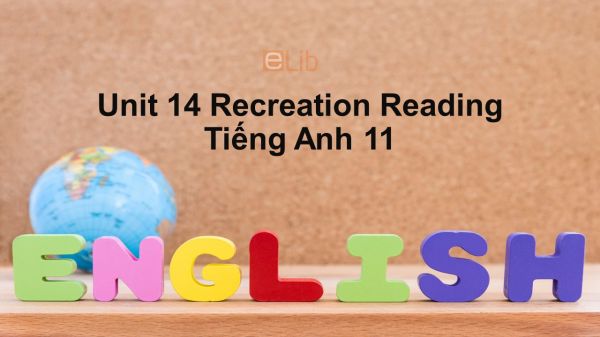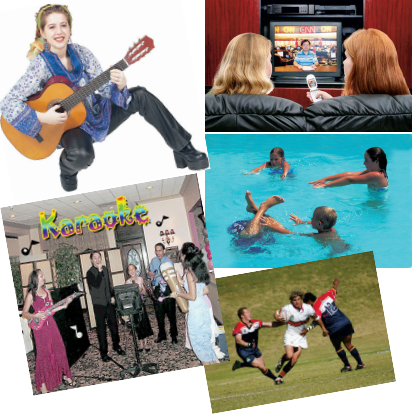Unit 14 lớp 11: Recreation-Reading
Bài học Unit 14 lớp 11 "Recreation" phần Reading giúp các em phát triển kỹ năng đọc hiểu tìm ý chính và chi tiết thông tin bài đọc về chủ đề giải trí.
Mục lục nội dung

1. Before You Read Unit 14 lớp 11
Work in pairs. Which of the following leisure activities do you think British people often do in their spare time?
(Làm việc theo cặp. Các hoạt động giải trí nào sau đây bạn nghĩ rằng người dân Anh thường làm trong thời gian rảnh rỗi của họ?)
.png) reading books/ newspapers (đọc sách/báo)
reading books/ newspapers (đọc sách/báo)
.png) watching T.V/ videos (xem ti vi/ video)
watching T.V/ videos (xem ti vi/ video)
.png) playing sports (chơi thể thao)
playing sports (chơi thể thao)
.png) meeting friends (gặp gỡ bạn bè)
meeting friends (gặp gỡ bạn bè)
.png) listening to music (nghe nhạc)
listening to music (nghe nhạc)
.png) watching sports (xem thể thao)
watching sports (xem thể thao)
.png) spending time outdoors (đi dã ngoại ngoài trời)
spending time outdoors (đi dã ngoại ngoài trời)
.png) playing a musical instrument (chơi một loại nhạc cụ)
playing a musical instrument (chơi một loại nhạc cụ)
Guide to answer
I guess that British people often go shopping, listen to music and meet friends in their spare time (Tôi đoán rằng người Anh thường đi mua sắm, nghe nhạc và gặp bạn bè trong thời gian rãnh rỗi)
2. While You Read Unit 14 lớp 11
Read the passage and then do the tasks that follow
(Đọc đoạn văn và làm các bài tập theo sau)
“All work and no play makes Jack a dull boy”, goes an English saying. Recreation and entertainment are important to people anywhere in the world. However, forms of popular entertainment are different in different countries.
In Britain, the most common leisure activities are home based. Watching television is by far the most popular pastime, and nearly all households have a television set. Over 51 per cent of households have two or more television sets and average viewing time for the population aged four and over is 25 hours a week. Other pursuits include listening to music, reading, do-it-yourself home improvements, and gardening.
British people are also very interested in watching and taking part in sports. Walking and swimming are the two most popular sporting activities, being almost equally undertaken by men and women. Snooker, pool and darts are the next most popular sports among men. The most popular spectator sports are football and rugby in w inter, and cricket and athletics in summer.
In the last few years in Britain, a new trend has been developing, i.e., taking weekend or holiday courses. There is an enormous range of courses on offer. The course can be as simple as bricklaying or as sophisticated as making your own stock market decisions. For people who are interested in arts, there are courses in painting or drawing. People who like music can take a course in karaoke singing. Courses like shoemaking or glass engraving provide people with practical skills they can do with their hands. Those who want to improve their minds can take a course of “Living with more meaning”. Entry qualifications to weekend courses are generous, that is, generally no qualifications are necessary, apart from an ability to pay the fees, which may be quite high.
Tạm dịch
Người Anh có câu: "Học mà không chơi biến Jack thành một cậu bé ngu si đần độn". Vui chơi giải trí là quan trọng đối với mọi người ở khắp mọi nơi trên thế giới. Tuy nhiên, các hình thức giải trí phổ biến khác nhau ở các quốc gia khác nhau.
Tại Anh, các hoạt động giải trí phổ biến nhất diễn ra ngay trong nhà. Xem ti vi là trò tiêu khiển phổ biến nhất, và gần như tất cả các hộ gia đình có một chiếc ti vi. Trên 51% hộ gia đình có từ hai ti vi trở lên và thời gian xem trung bình của người từ 4 tuổi trở lên là 25 giờ mỗi tuần. Các hoạt động khác bao gồm nghe nhạc, đọc sách, tự mình tân trang nhà cửa và làm vườn.
Người dân Anh cũng rất quan tâm đến việc xem và tham gia các môn thể thao. Đi bộ và bơi lội là hai hoạt động thể thao phổ biến nhất được hầu hết nam giới và phụ nữ tham gia. Snookers, bi-a 16 bi và phi tiêu là những môn thể thao phố biến tiếp theo ở nam giới. Các môn thể thao dành cho khán giả phổ biến nhất là bóng đá và bóng bầu dục vào mùa đông, bóng chày và điền kinh vào mùa hè.
Trong những năm gần đây, một xu hướng mới đã được phát triển, ví dụ như tham gia các khóa học cuối tuần hoặc ngày lễ. Có rất nhiều các khóa học được mở. Các khóa học có thể đơn giản như lát gạch hoặc phức tạp như chơi, tham gia thị trường chứng khoán. Đối vời những người quan tâm đến nghệ thuật, có những khóa học vẽ. Những người thích âm nhạc có thể tham gia khóa học hát karaoke. Các khóa học như đóng giày, chạm khắc thủy tinh cung cấp cho mọi người các kĩ năng thực tiễn giúp họ có thể làm bằng chính đôi tay của mình. Những người muốn mở mang đầu óc có thể tham gia khóa học "Sống ý nghĩa hơn". Các điều kiện tham gia các khóa học cuối tuần rất dễ, có nghĩa là, không cần chứng chỉ gì ngoài khả năng chi trả lệ phí, có thể là khá cao.
2.1. Task 1 Unit 14 lớp 11
The words/ phrases in italics in the following sentences all appear in the passage. Circle the correct answer
(Tất cả các từ/ cụm từ in nghiêng trong các câu sau xuất hiện trong đoạn văn. Khoanh tròn câu trả lời đúng)
1. The activities are home based. They are organized………..
A. at home
B. outdoors
C. in the basement of the house
2. Television viewing is by far the most popular pastime. This means………..
A. people have to go very far to watch television
B. television viewing is much more popular than any other pastime
C. television viewing is as popular as other pastimes
3. There are many different courses on offer. This means….....
A. there are many different courses on television
B. there are many different courses to be taken
C. there are many different courses that teach people to make offers
4. Besides watching television, people have other pursuits. This means…….
A. besides watching television, people have other leisure activities
B. besides watching television, people have to work
C. besides watching television, people don’t enjoy doing anything else
5. Spectator sports are……………
A. sports people take part in
B. sports people often watch
C. beautiful sports
6. Entry qualifications are……………
A. necessary conditions for being admitted to the course
B. ability to pay the fees
C. entry examinations
Guide to answer
1. A
The activities are home based. They are organized at home. (Những hoạt động giải diễn ra ở nhà. Chúng được tổ chức ở nhà.)
2. B
Television viewing is by far the most popular pastime. This means television viewing is much more popular than any other pastime. (Xem ti vi là thú tiêu khiển phổ biến nhất cho đến hiện tại. Điều này có nghĩa là xem ti vi phổ biến hơn nhiều so với bất cứ loại thú vui khác.)
3. B
There are many different courses on offer. This means there are many different courses to be taken. (Có nhiều khóa học khác nhau để bán. Điều này có nghĩa là có nhiều khóa học để đăng kí.)
4. A
Besides watching television, people have other pursuits. This means besides watching television, people have other leisure activities. (Bên cạnh xem ti vi, mọi người có các thú vui khác. Điều này có nghĩa là bên cạnh xem ti vi, con người có các hoạt động giải trí khác.)
5. B
Spectator sports are sports people often watch. (Những môn thể thao thút hút nhiều khán giả là những môn mà mọi người thường hay xem.)
6. A
Entry qualifications are necessary conditions for being admitted to the course. (Chứng nhận đầu vào là điều kiện cần thiết để được nhận vào khóa học.)
2.2. Task 2 Unit 14 lớp 11
Answer the questions
(Trả lời các câu hỏi)
1. Why are recreation and entertainment important to people?
(Tại sao tiêu khiển và giải trí là quan trọng với con người?)
2. What sports do the British like watching?
(Người Anh thích xem môn thể thao nào?)
3. What sports do they like taking part in?
(Họ thích tham gia chơi môn thể thao nào?)
4. Why do many British people take weekend courses?
(Tại sao nhiều người Anh tham gia các khóa học cuối tuần?)
Guide to answer
1. Because without them, people will become dull/ bored.
(Bởi vì không có chúng con người sẽ rất nhàm chán.)
2. Football and rugby in winter, and cricket and athletics in summer.
(Bóng đá và bóng bầu dục vào mùa đông, và cricket và điền kinh vào mùa hè.)
3. Walking and swimming.
(Đi bộ và bơi lội)
4. Because these courses will bring them great pleasure, entertainment and their life will be more meaningful.
(Bởi vì những khóa học này sẽ mang lại cho họ nhiều niềm vui, giải trí và cuộc sống của họ sẽ ý nghĩa hơn.)
3. After You Read Unit 14 lớp 11
Work in pairs. Discuss the question: Which of the British leisure activities mentioned in the passage are also popular in Vietnam. Which are not?
(Làm việc theo cặp. Thảo luận các câu hỏi về các hoạt động giải trí người Anh được đề cập trong đoạn cũng phổ biến tại Việt Nam? Cái nào không phổ biến?)
Guide to answer
A: Do you think the British leisure activities are the same as those in Vietnam?
B: I think some popular leisure activities in Vietnam are reading books, listening to music án surfing the Internet.
A: You're right. There’s no doubt about that. Besides, Vietnamese people like going on picnic with their family or friens on holiday.
Tạm dịch
A: Bạn có nghĩ rằng những hoạt động tiêu khiển của người Anh giống với ở Việt Nam?
B: Mình nghĩ một số hoạt động phổ biến ở Việt Nam là đọc sách, nghe nhạc và lướt web.
A: Đúng vậy. Không nghi ngờ gì về điều đó cả. Bên cạnh đó, người Việt Nam thích đi dã ngoại với gia đình hay bạn bè của họ vào kì nghĩ.
4. Practice
4.1. Reading
A. Fill in the each blank with one appropriate word (Điền các từ đã cho vào chỗ trống thích hợp)
regular demand leisure started means typically
chance way industry organised recent found
SPECTATOR SPORTS
A surprising number of popular spectator sports, for example football and baseball, (1) ........ started in Europe or in the USA in the nineteenth century. This did not happen by (2) ........ chance. It was the result of changes in the (3) ........ way people lived in those places at that time. Until then more people lived in the country than in towns. They worked in small groups and had no (4) ............. regular time off. All this changed, with the growth of factories and (5) ........... industry in the nineteenth century, first in Europe and then in the USA. For the first time most people began to live in towns, and they (6) ........... found themselves with regular free time. They had more (7) ............. leisure time than ever before. This resulted in the need for the (8) ........... organised entertainment. Suitable games I developed or were invented, (9) ......... typically team games, in which the crowded could take sides and become involved. This gave people some of the entertainment they need in their free time. The (10) .......... recent explosion in TV, with the introduction of satellite and cable channels, has caused an increase in (11) ............. demand for sports as entertainment. The money TV has brought to games such as football, tennis and baseball (12) ............... means, that spectator sports will certainly go on playing an important part in our lives.
B. Read the passage carefully, then choose the correct answer (Đọc đoạn văn trên thật kĩ và chọn câu trả lời đúng nhất)
England is famous for its garden, and most people like gardening. This is probably one reason why so many people prefer to live in houses rather than in flats. Particularly in suburban areas it is possible to pass row after row of ordinary small houses, each one with its neatly kept patch of grass surrounded by great variety of flowers and shrubs. Enthusiasts of gardening get a great deal of helpful advice from the television and magazines.
1. The passage points out that, because many English people are fond of gardening, ______.
a. they don't want to live in suburban areas
b. they grow flowers but not grass and fruit trees
c. they can spare little time for the television
d. houses are more popular than flats
2. The passage stresses that people interested in gardening ______.
a. find it necessary to move out to distant rural areas
b. need large gardens in order to get ,satisfaction
c. are supplied with information and guidance by both the television and the press
d. get very little encouragement from the media
3. The passage is concerned with ______.
a. the enthusiasm of the people in England for gardens and gardening
b. the problems of gardening in suburban areas
c. the new techniques in gardening
d. the increasing demand for new varieties of flowers and shrubs
4.2. Multiple-choice
Để nâng cao kĩ năng đọc với chủ đề "Recreation", mời các em cùng luyện tập với phần trắc nghiệm Unit 14 Reading Tiếng Anh 11 sau đây.
5. Conclusion
Qua bài học này các em cần lưu ý các từ vựng sau
- spare time ['speə,'taim] (n): thời gian rảnh rỗi
- to play a musical instrument ['mju:zikəl, 'instrumənt] (exp.): chơi nhạc cụ
- dull boy [dʌl] (n): cậu bé buồn chán
- recreation [,rekri'ei∫n] (n): thú tiêu khiển
- entertainment [,entə'teinmənt] (n): giải trí
- leisure activity ['leʒə, æk'tiviti] (n): hoạt động giải trí
- pastime ['pɑ:staim] (n): trò tiêu khiển, sự giải trí
- household ['haushould] (n): hộ gia đình
- pursuit [pə'sju:t] (n): sự theo đuổi
- to do - it - yourself (DIY) (exp.): tự làm
- snooker ['snu:kə] (n): môn bida lỗ
- dart [dɑ:t] (n): môn ném phi tiêu
- spectator sportds [spek'teitə'spɔ:ts] (n): những môn thể thao thu hút nhiều khán giả
- rugby ['rʌgbi] (n): bóng bầu dục
- cricket ['krikit] (n) : môn cricke
- enormous [i'nɔ:məs] (adj): to lớn, khổng lồ
- bricklaying ['brikleiiη] (n): lát gạch
- sophisticated [sə'fistikeitid] (adj): phức tạp, rắc rối
- stock market decision [stɔk, 'mɑ:kit, di'siʒn] (exp.): quyết định trong thị trường chứng khoán
- shoemaking ['∫u:,meikiη] (n): đóng giày
- glass engraving [glɑ:s,in'greiviη] (n): khắc kính
- practical ['præktikl] (adj): thực tế, thực hành
- entry qualification ['entri, kwɔlifi'kei∫n] (n): điều kiện nhập học, điều kiện tham gia
- generous ['dʒenərəs] (adj): rộng rãi
- to pay the fees [fi:z] (exp.) (pay – paid – paid): chi trả học phí
- qualification [kwɔlifi'kei∫n] = ability [ə'biliti] (n): kỹ năng, khả năng
- athletics [æθ'letiks] (n): môn điền kinh
Tham khảo thêm
- doc Unit 14 lớp 11: Recreation-Speaking
- doc Unit 14 lớp 11: Recreation-Listening
- doc Unit 14 lớp 11: Recreation-Writing
- doc Unit 14 lớp 11: Recreation-Language Focus




